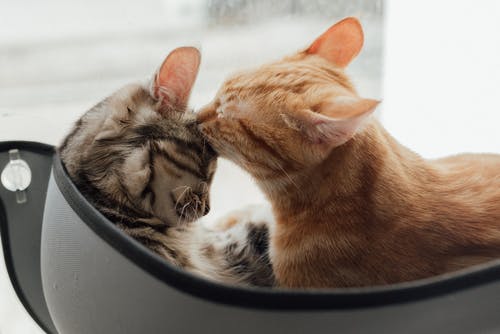
Top 10 Questions Pet Owners Ask About Geriatric Pet Care
July 28, 2023Top 10 Questions Pet Owners Ask About Geriatric Pet Care
As pet lifespans increase, so does the responsibility of providing proper geriatric pet care. Fortunately, learning about senior pets extends your current knowledge. This article answers the top 10 pet owners’ questions about geriatric pet care, ensuring you can support your pet through its golden years.
1. How can I tell if my aging pet is too thin or overweight?
With age, pets may lose muscle mass and undergo weight changes, often worrying their owners. To determine whether your pet is too thin or overweight, consult your veterinarian for an assessment. They can recommend the right combination of diet and exercise adaptations for your aging pet.
2. Should I change my geriatric pet’s diet or add supplements?
Not all pets require a diet change as they age as long as they’re fed a “complete and balanced” commercial diet appropriate for their species and life stage. However, consult your veterinarian to determine when to transition your pet to a senior diet. If your aging pet has specific health issues, your vet can also guide you on specialized diets and supplements that could help address those concerns.
3. Is my geriatric pet too old for anesthesia?
Modern anesthetic drugs and techniques have significantly decreased concerns over geriatric pets and anesthesia. Many senior patients undergo anesthesia for surgeries or dental procedures. However, pre-anesthetic blood work for older pets is still crucial to help your veterinarian tailor the anesthesia to your pet’s needs.
4. How do I differentiate between my aging pet’s age-related changes and treatable health issues?
Recognizing that personality changes, activity level alterations, and pain are not “normal” aging functions is essential. Consult your veterinarian about these changes so that treatable diseases and conditions are noticed. Regular checkups are crucial to maintaining your aging pet’s health.
5. Should I add a new puppy or kitten with an older pet to my household?
This decision depends on your older pet’s personality and species. Adding a new pet can benefit the senior pet’s socialization and activity levels. However, for others, it could cause stress and disruption. Adequately assess the compatibility of your pets, and consider fostering a new addition before making a lifelong commitment.
6. How can I help my geriatric pet cope with joint pain and arthritis?
After initiating a veterinarian-approved arthritis treatment plan, focus on making your pet feel as comfortable and secure as possible. Add stairs, ramps, or orthopedic beds to improve mobility. Regular exercise and modifications like no-slip flooring or slings can also help maintain muscle strength and alleviate joint pain.
Wellness Exams
An essential part of your pet’s geriatric care is regular wellness exams. For example, obtaining expert cat exams in Seattle will help ensure your pet is in good health and receives necessary recommendations for its overall well-being.
Geriatric Care Services
Specialized geriatric vet services ensure your aging pet receives appropriate care tailored to their needs. Veterinarians skilled in senior care will know how to manage age-associated issues best and help maintain your pet’s quality of life.
Diagnostic Laboratory Services
In addition to wellness exams and geriatric care, vet lab services play a vital role in diagnosing and monitoring your aging pet’s health. Access to a diagnostic laboratory allows your veterinarian to perform tests that provide valuable insights into your pet’s overall health, enabling them to make informed decisions about appropriate treatments and interventions.
7. How can I improve my aging pet’s quality of life?
Adapting to your pet’s changing needs as they age can significantly improve their quality of life. For pets losing vision or hearing, establish stable routines and provide cues that utilize their remaining senses. Enhance their appetite by heating food or selecting aromatic options. Utilize floor runners or stabilizing booties for pets with decreased coordination, and ensure proper bedding and warmth for those more sensitive to cold.
8. What are signs of cognitive decline in older pets, and what can I do to help?
Indicators of cognitive dysfunction in aging pets include memory loss, confusion, and difficulty learning. To help combat cognitive decline, engage your pet with mental stimulation and environmental enrichment. Discuss potential supplements and medications with your veterinarian that could aid in maintaining your pet’s cognitive function.
9. How often should my geriatric pet visit the veterinarian?
Regular checkups are crucial for aging pets, with the frequency depending on factors such as age, breed, and underlying health conditions. Preventative care and early detection of health problems can significantly improve your pet’s quality of life, making routine visits to the veterinarian essential.
10. What exercise and physical activity are appropriate for my older pet?
Adapting exercise routines to your aging pet’s limitations is crucial in maintaining muscle mass and overall health. Monitor your pet for signs of discomfort or strain, and consult your veterinarian for appropriate exercises based on your pet’s age and health.
Conclusion
Understanding and addressing the unique needs of aging pets is essential for ensuring their health, happiness, and well-being. Consult your veterinarian, engage with fellow pet owners, and educate yourself on geriatric pet care. With the proper knowledge and resources, you can confidently navigate the challenges and joys of your pet’s golden years.




